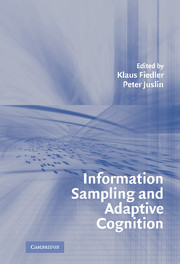
-
Select format
-
- Publisher:
- Cambridge University Press
- Publication date:
- 02 February 2010
- 05 December 2005
- ISBN:
- 9780511614576
- 9780521831598
- 9780521539333
- Dimensions:
- (228 x 152 mm)
- Weight & Pages:
- 0.767kg, 498 Pages
- Dimensions:
- (228 x 152 mm)
- Weight & Pages:
- 0.655kg, 498 Pages
- Subjects:
- Social Psychology, Life Sciences, Pharmacology, Psychology
You may already have access via personal or institutional login- Subjects:
- Social Psychology, Life Sciences, Pharmacology, Psychology
Book description
A 'sample' is not only a concept from statistics that has penetrated common sense but also a metaphor that has inspired much research and theorizing in current psychology. The sampling approach emphasizes the selectivity and the biases that are inherent in the samples of information input with which judges and decision makers are fed. As environmental samples are rarely random, or representative of the world as a whole, decision making calls for censorship and critical evaluation of the data given. However, even the most intelligent decision makers tend to behave like 'näive intuitive statisticians': quite sensitive to the data given but uncritical concerning the source of the data. Thus, the vicissitudes of sampling information in the environment together with the failure to monitor and control sampling effects adequately provide a key to re-interpreting findings obtained in the last two decades of research on judgment and decision making.
Contents
Metrics
Altmetric attention score
Full text views
Full text views help Loading metrics...
Loading metrics...
* Views captured on Cambridge Core between #date#. This data will be updated every 24 hours.
Usage data cannot currently be displayed.
Accessibility standard: Unknown
Why this information is here
This section outlines the accessibility features of this content - including support for screen readers, full keyboard navigation and high-contrast display options. This may not be relevant for you.
Accessibility Information
Accessibility compliance for the PDF of this book is currently unknown and may be updated in the future.


